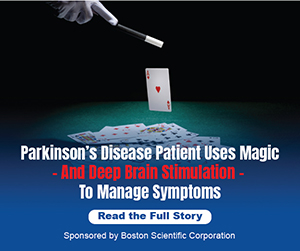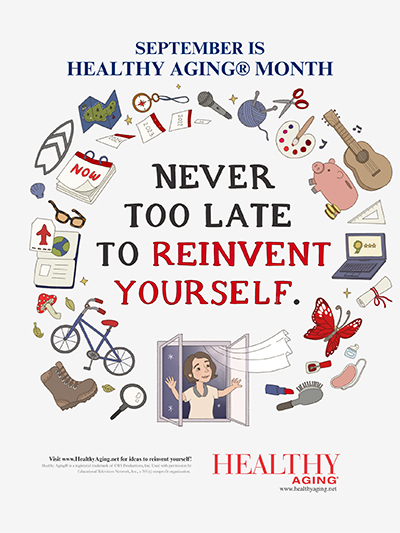By Sharona Hoffman
 On October 15, 2013 my husband, at the age of 55, learned that he has Parkinson’s disease. He had had a tremor for many months, and when it grew more persistent and pronounced, Andy decided it was time to see a neurologist. We had been anxious for days before the appointment. Hours of Internet searches encouraged us to cling to the hope that the tremor was benign, as many are. But we also knew that we could get life-changing news from the doctor.
On October 15, 2013 my husband, at the age of 55, learned that he has Parkinson’s disease. He had had a tremor for many months, and when it grew more persistent and pronounced, Andy decided it was time to see a neurologist. We had been anxious for days before the appointment. Hours of Internet searches encouraged us to cling to the hope that the tremor was benign, as many are. But we also knew that we could get life-changing news from the doctor.
The life-changing medical diagnosis
The neurologist did a very thorough examination. Then, without indicating that he was ready to deliver his decree, he blurted out, “Well, this is clearly Parkinson’s disease.” He explained that it was an incurable, degenerative, neurological disease caused by loss of dopamine cells in the brain and that it usually progresses over decades. The doctor discussed a variety of drugs and recommended one for Andy to try first, assuring us that “most patients tolerate this one well.” He instructed us to make another appointment in three months and left the exam room to see his next patient.
What followed were some of the most difficult days of our marriage. Life had changed in an instant. We were consumed by fear that our future was bleak and uncertain, that our place in the world had permanently shifted, that our sense of ourselves would never be the same. And our next medical appointment was not for three months.
While our friends were incredibly patient, affectionate, and encouraging, we were left on our own to construct professional support systems. In the turmoil of the days and weeks after the diagnosis, what Andy needed was someone to call frequently to discuss his symptoms, his reaction to the new medication, his mood. He very much would have appreciated having access to a nurse practitioner or a physician assistant who could spend time providing reassurance that this disease could be managed and that life could go on. Waiting for several months for our next contact with a medical professional was not a viable option.
I don’t think Andy’s doctor was atypical or that he deviated from standard protocol. But patients receiving life-changing diagnoses need much more intensive attention, and they need to benefit from a team approach.
In 1994, when my mother became a breast cancer patient at M.D. Anderson in Houston, a social worker literally ran after us as we left one of the first doctors’ appointments to make sure that we learned about a variety of resources that the cancer center offered to promote patients’ mental and emotional well-being. How I wish that all medical centers adopted similar practices!
According to experts, up to 60% of Parkinson’s disease patients experience depression. Overlooking these symptoms can have devastating consequences for them. We took initiative, sought a second opinion regarding the diagnosis, and consulted several mental health professionals.
But we had to figure out on our own that all this should be done.
How to be a key member of your medical team
My husband and I have learned that it is critical to become an active participant in your own medical care. In the words of Leana Wen and Joshua Kosowsky who wrote When Doctors Don’t Listen, the patient must transform “from being a passive participant who answers yes or no, and submits to tests to being an active storyteller and equal partner in the diagnostic process.” Doctors have approximately 15 minutes to spend with each patient during a typical office visit. As a patient, therefore, you need to feel empowered to guide the physician and to be a key member of your medical team.
Four strategies
To that end, I offer four general strategies:
Ask Questions
Make sure to ask questions. When a doctor prescribes a medication or recommends a treatment course, the patient should ask questions. How will this drug interact with others that I’m taking? I’m already on several other daily medications, is it really necessary to add another? You are recommending aggressive intervention (e.g. surgery), but are there other options that I should consider first? When accompanying relatives to medical appointments, I have found the following cliché but pointed question to be particularly effective: If this were your mother or sister, which alternative would you select for her?
Use the Internet
Don’t be afraid of the Internet – use it as a resource and understand its limits. There is nothing wrong with conducting background research before going to the doctor. While not all websites are reliable, many are managed by very reputable entities, such as the National Institutes of Health, the Centers for Disease Control and Prevention, the American Medical Association, and various prestigious professional organizations. Andy and I have learned a great deal about Parkinson’s disease symptoms, treatments, drug side effects, and clinical trials through our own electronic research.
Of course, Internet searches should not replace consultation with medical experts, and you should recognize their pitfalls. You should not panic based on what you have learned from the Internet and torment yourself with thoughts of disability and death before you have even been examined by a physician. You should not go to the doctor with a closed mind, convinced that you know exactly what your malady is and what treatment you require. However, research can equip patients to discuss their symptoms more intelligently, ask the right questions, and have more productive and satisfying visits with their health care providers.
Look for other resources
Seek other resources. If you receive a serious diagnosis, reading relevant literature and communicating with similar patients through Facebook, blogs, support groups, or other means can be invaluable. Ask your doctor to recommend reliable websites, books, support groups, and additional resources. The best advice often comes from fellow patients who have coped with the illness and navigated through treatment longer than you have, and thus, finding ways to connect with them is well worth the effort.
Develop a human support system
Have human contact. Equally vital is having in-person support during important medical encounters.
My rules of thumb for my own medical care and that of family members are:
1) don’t be shy about sharing health problems with loved ones and asking for reasonable assistance, and
2) don’t go to any important medical appointment or to the hospital alone. You should have another individual in the room to hear the doctors’ explanations, take notes, formulate appropriate questions, and help you review what happened during the visit. In the hospital, it is also important to have someone who can find the nurses when they don’t respond to the call button quickly, urge nurses to page the doctor in order to ask for further measures to relieve discomfort, and pose appropriate questions about treatment and prognosis whenever a doctor pops in briefly.
Everyone gets sick at some point. No matter how much help you need now, you will have plenty of opportunities to reciprocate later!












